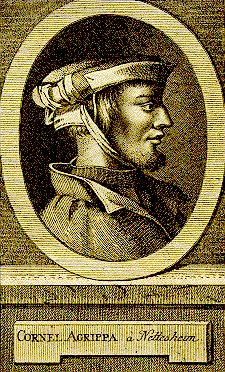| Cornelius Agrippa  AKA Heinrich Cornelius Agrippa von Nettesheim AKA Heinrich Cornelius Agrippa von Nettesheim
Born: 14-Sep-1486
Birthplace: Cologne, Germany
Died: 18-Feb-1535
Location of death: Grenoble, France
Cause of death: unspecified
Gender: Male
Religion: Roman Catholic
Race or Ethnicity: White
Sexual orientation: Straight
Occupation: Magician, Scientist Nationality: Germany
Executive summary: Three Books of Occult Philosophy Cornelius Agrippa was a medieval German alchemist, astrologer, occultist and scientific writer who contributed to the rise of skepticism in his era. His best known work, Three Books of Occult Philosophy, was considered a virtual encyclopedia of magic and the occult arts, but paradoxically, his The Vanity and Uncertainty of the Arts and Sciences offered a thoughtful critique of human knowledge in numerous realms, including astrology and mysticism. He practiced as both a lawyer and physician, and his students included Johannes Wier. He was an early feminist, noted for his protestations against the subjection of women and witch-hunting frenzies in a time when such arguments were literally considered heresy. His writings were widely read, translated into numerous languages, and referenced long after his death. Father: Heinrich von Nettesheim
Wife: (m. 1515, d. 1521)
Wife: (m. 1522, d. 1529 plague)
University: BA, University of Cologne (1500)
University: MA, University of Cologne (1502)
University: University of Paris (attended, c. 1507)
Teacher: University of Dôle (1509-10)
Knighthood
Debtor's Prison (1531)
Escaped from Prison (1531)
Heresy (1533)
Exiled (1533)
Escaped from Prison Lyons, France (1535)
Author of books:
Declamation on the Nobility and Preeminence of the Female Sex (1529)
The Vanity and Uncertainty of the Arts and Sciences (1530)
Three Books of Occult Philosophy (1531)
Dialogue on the Vanity of the Sciences and the Ruin of the Christian Religion (1534, pseudonymous; authorship uncertain)
On the Monogamy of St. Anne (1534)
Do you know something we don't?
Submit a correction or make a comment about this profile
Copyright ©2019 Soylent Communications
|